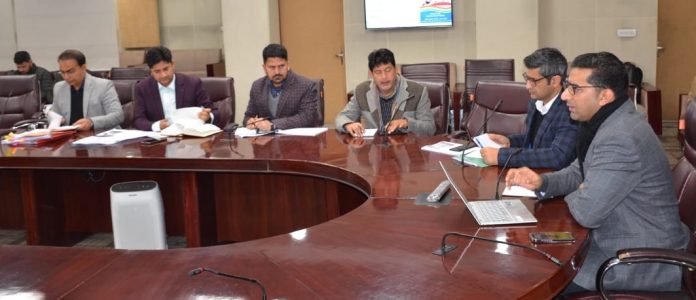JAMMU: Secretary, Rural Development Department (RDD) and Panchayati Raj, Dr Shahid Iqbal Choudhary on Saturday concluded a comprehensive series of meetings across 10 districts within the Jammu Division.
These meetings were aimed at discussing the Labour Budget for the fiscal year 2024-25 and formulating an Annual Action Plan for development initiatives in the region.
The meeting which was also attended by Assistant Commissioner Development (ACDs) of different districts emphasized the critical importance of convergence with various departments, including the Forest Department, Social Forestry, Youth Service and Sports, Agriculture Department, and more, to ensure a comprehensive and community-centric approach to development.
Dr Shahid underscored the profound significance of the MGNREGA plan, emphasizing that it transcends being a mere document, serving as a visionary guide for society’s development with clarity and purpose.
Key aspects addressed during the meetings included the development of community assets, support for vulnerable sections of society, and prioritization of projects directly benefiting the community. Special attention was given to Category B works focusing on natural resource management and the welfare of vulnerable sections.
Dr Shahid stressed the need to allocation of 60% of expenses towards agriculture and allied works, emphasizing the pivotal role of boosting the agricultural sector for overall community development.
He underscored the importance of timely payments of wages through the Aadhaar Based Payment System to enhance transparency and accountability.
Other crucial discussions included a focus on social audit, addressing Electronic Money Transfer (EMT) issues, and investing in training and skill development programs to foster personal development among the workforce engaged in MGNREGA initiatives.
The formulated plan encompasses strategies for improving land productivity, enhancing livelihoods through various agricultural activities, and developing fallow or waste lands.
The provisions for infrastructure development for livestock and fisheries, along with the construction of bio-gas plants for individuals and communities, were also outlined to promote sustainable practices.
Other issues such as Geo-tagging, NMMS usage, and the closure of social audit concerns were addressed in the meetings.
Dr. Shahid stressed the importance of timely billing, monthly convergence meetings, and maintaining registers for the effective implementation of the plan.
He urged initiation of Unnati training programs to empower the workforce with essential skills, aligning with the broader goal of personal and professional development.
Recognizing the importance of Geo-tagging in project execution, Dr Shahid outlined the initiation of recovery measures if there is no improvement in Geo-tagging pendencies in Phase-1 and Phase-2.
Furthermore, he stressed the importance of 100% usage of the National MGNREGS Management System (NMMS) and encourages the adoption of the Janmanrega app for a more efficient workflow.
To ensure financial transparency, Dr Shahid emphasizes the proper maintenance of the seven required registers and calls for timely billing processes.
Waseem Raja, Additional Secretary, RDD highlighted the progress of MGNREGA, noting that 85% of audited panchayats have been covered this year.
He emphasized the Social Audit Units crucial role in facilitating audits, ensuring transparency through the social audit and its importance.


